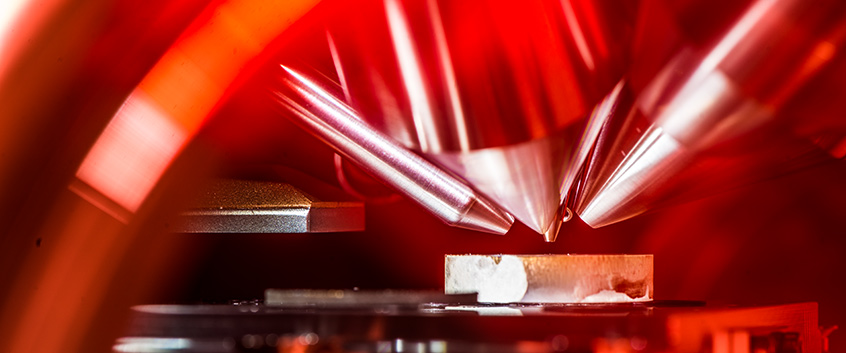
Technology Platforms & High-tech Labs
As an international competence centre for environmental sciences, the UFZ owns several innovative research facilities in the fields of:
- Microscopy for biology and material science,
- 3D-visualisation of data and numeric simulations,
- Isotope analytics
- Bioreactor systems,
- Mass spectroscopy in metobolomics and proteomics,
- Technologies for high-resolution exploration of subsurface structures, integrated earth observation and a ground-truth-data-based interpretation of satellite data,
- Equipment for surface water analysis,
- Various greenhouses and open spaces for outdoor tests to study the consequences of climate change.
Our technology platforms offer vital links to science and industry. Moreover, they are starting points for future research projects.
For further information, please contact the experts at our centre.
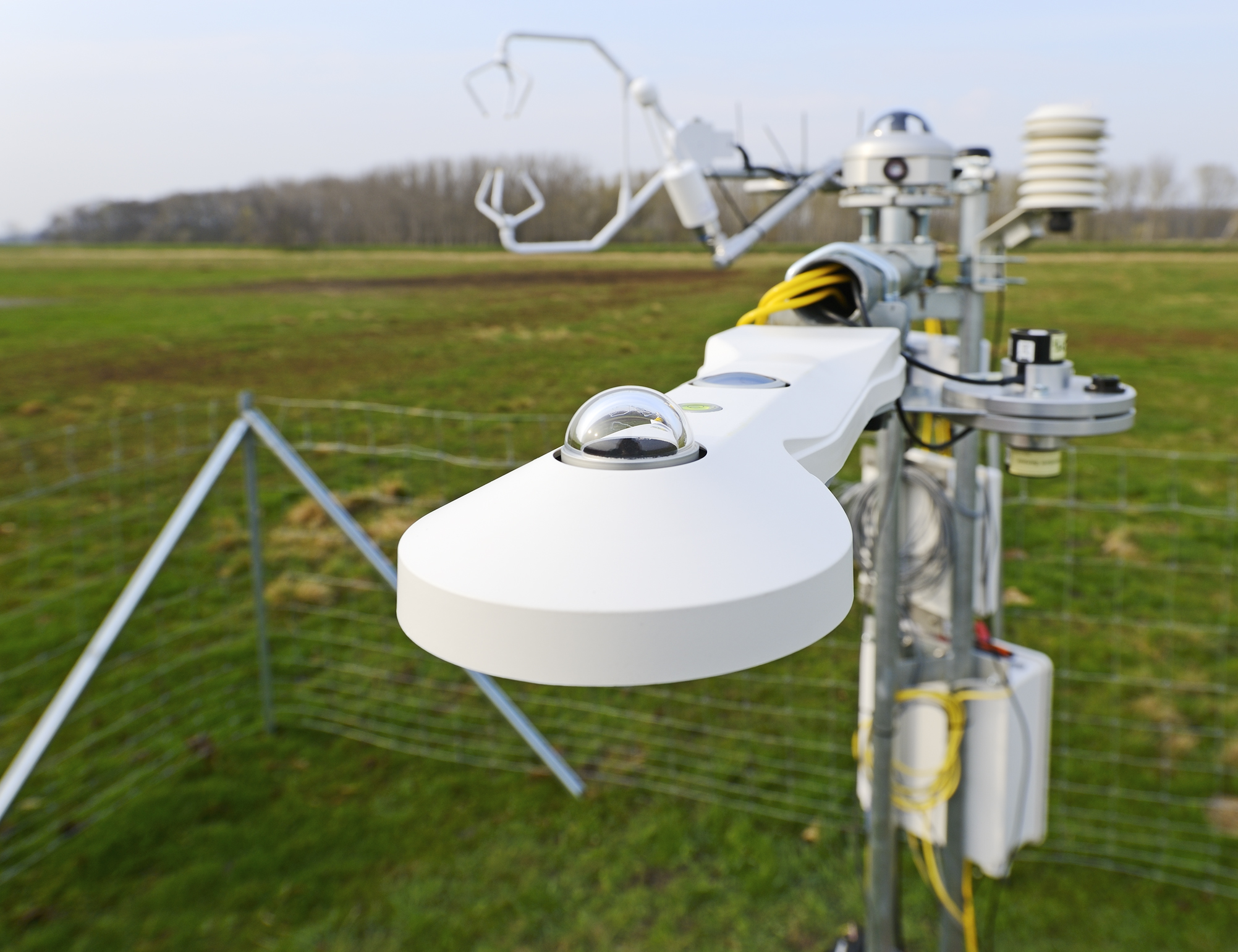 ACROSS (Advanced Remote Sensing - Ground Truth Demo and Test Facilities)
ACROSS (Advanced Remote Sensing - Ground Truth Demo and Test Facilities)
ACROSS provides field data across different spatial and temporal scales and environmental compartments in order to enhance the interpretation of satellite data for environmental science. The UFZ partly coordinates the ACROSS infrastructure and contributes to the terrestrial platform by investigating hydrogeophysical and ecological parameters like soil moisture, temperature, carbon and water fluxes by using, for example, mobile cosmic ray neutron probes, Eddy-Covariance stations and LiDAR technologies.
Services:
- Access to databases on ground-truth data for environmental variables
- Information on measurement projects, accessible data and international cooperation
Contact:
Dr. Steffen Zacharias
Department of Monitoring and Exploration Technologies
Phone +49 341 235-1381
steffen.zacharias@ufz.de
Prof. Dr. Andreas Huth
Department of Ecological Modelling
Phone +49 341 235-1719
andreas.huth@ufz.de
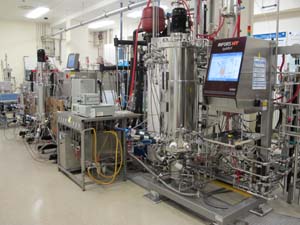 The bioreactor pilot plant consists of modern bioreactor technology for the cultivation of different microorganisms like bacteria, yeast and fungi. It offers multi- and laboratory bioreactor systems from 0,5 to 2 litres as well as a set of geometrically similar reactors for a scaling up with working volumes ranging between 5 and 100 litres. The facility is completed by devices for analytics along the bioprocess and cell separation and thus, enables an integral approach for the investigation, development and optimization of bioprocesses.
The bioreactor pilot plant consists of modern bioreactor technology for the cultivation of different microorganisms like bacteria, yeast and fungi. It offers multi- and laboratory bioreactor systems from 0,5 to 2 litres as well as a set of geometrically similar reactors for a scaling up with working volumes ranging between 5 and 100 litres. The facility is completed by devices for analytics along the bioprocess and cell separation and thus, enables an integral approach for the investigation, development and optimization of bioprocesses.
Services:
- Research and development of bioprocesses and biotechnology
- Fermentations on contract
- Training courses
Contact:
Steffi Hunger
Centre for Environmental Biotechnology
Phone +49 341 235 1587
steffi.hunger@ufz.de
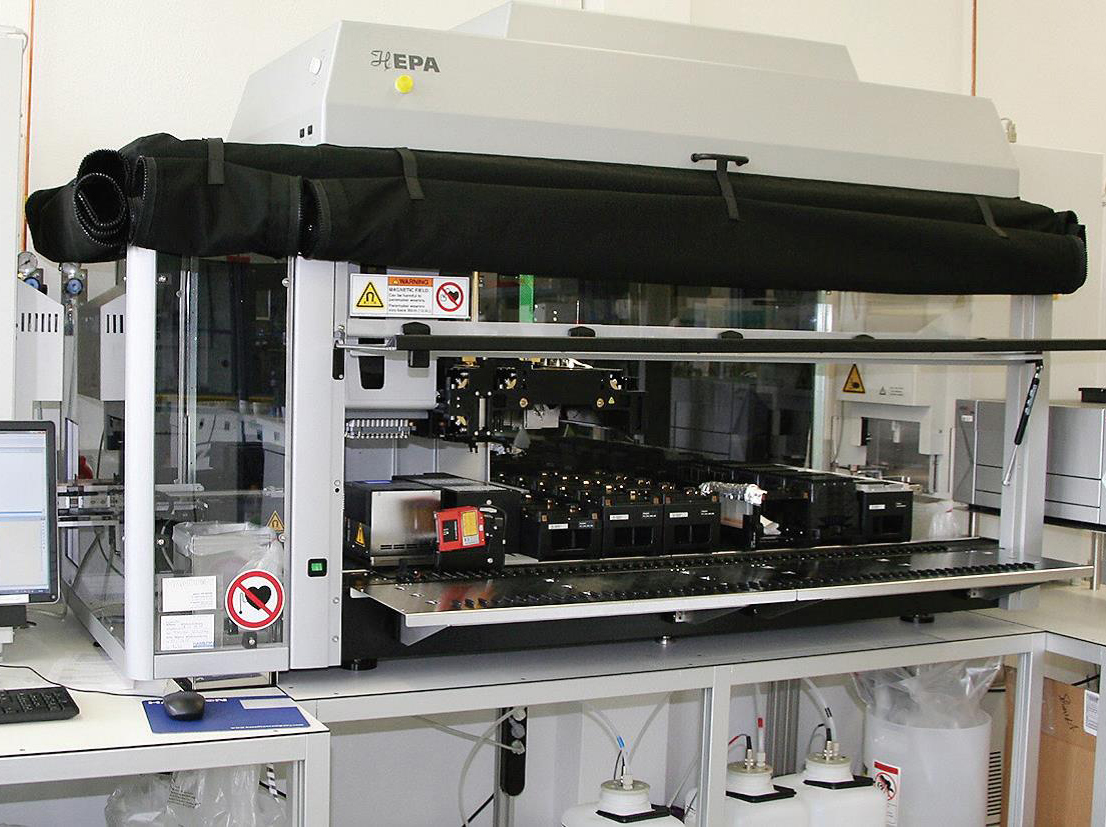 CITEPro provides a platform for high-throughput sample preparation, the automated exposure of cell cultures and aquatic organisms, and the automated analysis of the effects and chemical concentrations for large numbers of chemicals and environmental samples.
CITEPro provides a platform for high-throughput sample preparation, the automated exposure of cell cultures and aquatic organisms, and the automated analysis of the effects and chemical concentrations for large numbers of chemicals and environmental samples.
The platform can increase the sample throughput of established bioanalytical, toxicological and analytical methods and is therefore suited for a wide range of applications including the spatial and temporal resolution of contamination with micropollutants in various environmental matrices from water, sediment and soil to biota and humans.
The implementation of the infrastructure will be finished in 2018, CITEPro is planned to be officially launched end of 2018, and integration is planned for 2019, so that CITEPro will be operational by 2020. During the implementation and integration phases, pilot research projects have already been running and will continue to do so in these phases.
Services:
- cellular high-throughput bioassays combined with chemical analysis,
- robotic platforms for cell-based bioassays,
- HTS algae testing (planned from 2019)
- automated imaging system for zebra fish embryo toxicity tests
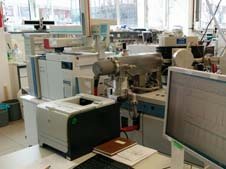 The Laboratories for Stable Isotopes (LSI) are a unique competence center for analyzing light element stable isotopes (e.g., H, C, N, O, S, Cl). The associated laboratories offer state-of-the-art instrumentation for stable isotope analytics, hold several licensed methodological patents and act as a reference laboratory for the IAEA and NIST. Core competencies are on-line bulk and compound-specific isotope analyses (BSIA and CSIA). This includes the respective sample preparation techniques, the development of methods for isotope analytics of gaseous, liquid and solid samples, quality control and management, as well as the development and calibration of international reference materials. The expertise of the LSI is applied in a large variety of process studies and reflected in numerous publications.
The Laboratories for Stable Isotopes (LSI) are a unique competence center for analyzing light element stable isotopes (e.g., H, C, N, O, S, Cl). The associated laboratories offer state-of-the-art instrumentation for stable isotope analytics, hold several licensed methodological patents and act as a reference laboratory for the IAEA and NIST. Core competencies are on-line bulk and compound-specific isotope analyses (BSIA and CSIA). This includes the respective sample preparation techniques, the development of methods for isotope analytics of gaseous, liquid and solid samples, quality control and management, as well as the development and calibration of international reference materials. The expertise of the LSI is applied in a large variety of process studies and reflected in numerous publications.
For more information on our expertise and technical facilities, please consult our website or contact us directly.
Services:
- Compound-specific analysis of environmental samples
- Isotope forensic studies
- Cooperation partner in projects with university and non-university institutions as well as industry, development of new methods
- Analytics on contract, consultancy basis
- Training courses
Contact:
Dr. Steffen Kümmel
Department of Isotope Biogeochemistry
Phone +49 341 235-1362
steffen.kuemmel@ufz.de
Dr. Kay Knöller
Department of Catchment Hydrology
Phone +49 345 558 5433
kay.knoeller@ufz.de
Dr. Mario Brauns
Department of River Ecology
Phone +49 391 810 9140
mario.brauns@ufz.de
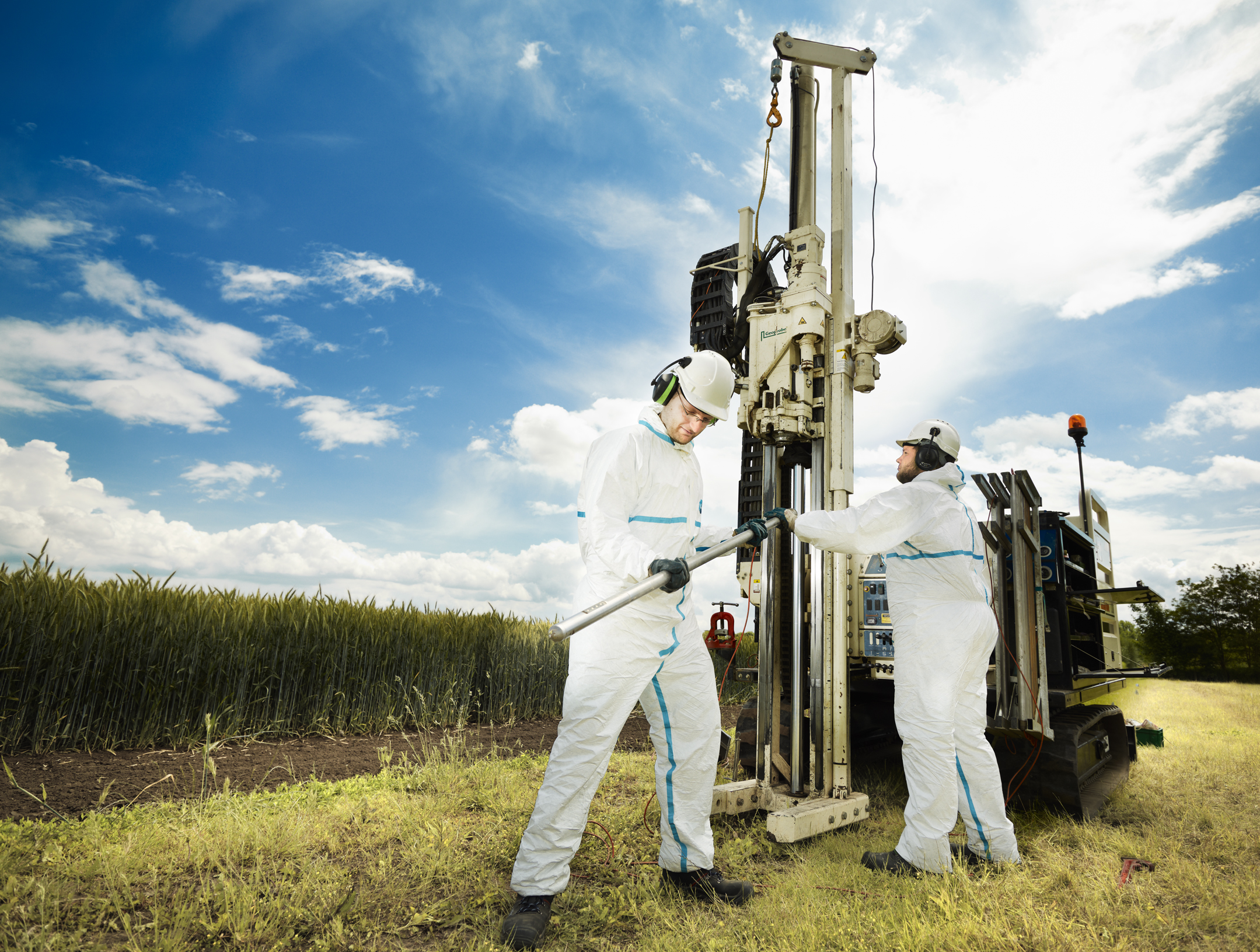 MOSAIC (Model Driven Site Assessment, Information and Control)
MOSAIC (Model Driven Site Assessment, Information and Control)
MOSAIC is a platform for the model-based, high-resolution exploration of complex subsurface structures by applying and combining minimally invasive methods. Therefore, MOSAIC allows the investigation of large scale field sites with complex geology. The platform combines various methods such as direct push technologies, on-site analytical methods, geophysical, tomographic, as well as hydrogeological techniques. A further innovative approach is the adaptive site investigation, which allows an optimized exploration process quality and time due to the dynamic use of suitable methods within the MOSAIC platform.
Services:
- Research and development of innovative monitoring and exploration technologies as well as their practical establishment due to projects and cooperation projects with industry partners, universities and other research institutions
- Technology transfer (training courses for technical authorities and engineering consultants, workshops and pilot studies)
Contact:
Dr. Ulrike Werban
Department of Monitoring and Exploration Technologies
Phone +49 341 235-1989
ulrike.werban@ufz.de
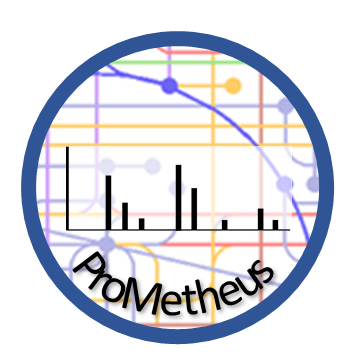 Prometheus- Platform for metabolomics analysis
Prometheus- Platform for metabolomics analysis
The Prometheus platform offers most modern mass spectroscopy (GC and LS/MS) for profiling, identification and quantification of exogenic and endogenic metabolites in epidemiological studies and cellular models. The metabolites are extracted and measured from different biological matrices (e.g. serum, urine, adipose tissue as well as eukaryotic and prokaryotic cultures). Data analysis by means of well-established analysis routines allows detecting alterations of amino acids, biogenic amines and lipids in the entire metabolism.
Services:
- Targeted serum profiling (183 metabolites) with absolute quantification
- Untargeted serum profiling with relative quantification (ca. 27.000 peaks)
- Intracellular central metabolites of the carbon and nitrogen metabolism
- Detection of specific metabolites, e.g., prostaglandins or CoA esters
Contact:
Dr. Ulrike Rolle-Kampczyk
Department of Molecular Systems Biology
Phone +49 341 235-1537
ulrike.rolle-kampczyk@ufz.de
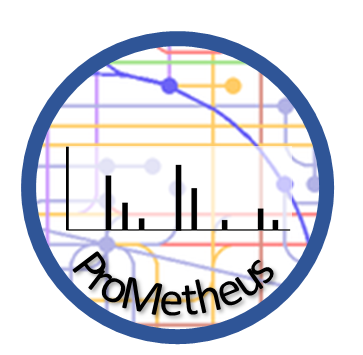 Prometheus- Platform for proteomic analysis
Prometheus- Platform for proteomic analysis
Prometheus offers targeted and non-targeted proteomic analysis in simple (gel bands, affinity enriched) and complex samples (extracts from cell culture, tissue, body fluids, microbial consortia) by using the broad expertise of the Department of Molecular Systems Biology and state of the art equipment. For quantification the techniques of SILAC (stable isotope labeling of amino acids in cell cultures), label free, TMT (tandem mass tag) and SRM (selected reaction monitoring) are established. For microbial ecology we developed the Protein-SIP (stable isotope probing) approach as well as bioinformatics tools which are applied to protein-protein-interaction studies and phosphoproteomics. Proteome data analysis is performed routinely by Ingenuity Pathway Analysis.
Services:
- Proteomic Analysis (SILAC, metabolic Labeling 15N, LFQ, TMT) allowing an absolute quantification
- Quantitative determination of posttranslational modifications (Phosphorylation, Acetylation)
- Protein-protein interaction
- MS based protein structure analysis (H/D exchange)
- Atomic flux in microbial communities (Protein-SIP; 13C, 15N, 34736S)
- Targeted Proteomics (SRM, PIR)
Contact:
Prof. Dr. Martin von Bergen
Department of Molecular Systems Biology
Phone +49 341 235-1211
martin.vonbergen@ufz.de
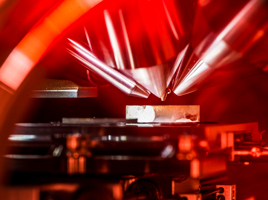 ProVIS – Platform for visualisation of biochemical processes at the cellular level
ProVIS – Platform for visualisation of biochemical processes at the cellular level
The technology platform ProVIS is funded by the Helmholtz Association and the European Regional Development Fund. It provides a unique pool of scientific equipment combining imaging technologies with methods for chemical analysis to study biological samples, structures and surfaces on a nanometer scale. The technology comprises high-resolution atomic force, electron and ion microscopy as well as several mass spectrometry methods which are used to answer questions from fundamental research to applied science. Main research focus at the UFZ is the investigation of structural and functional properties and regulatory processes of environmentally relevant microorganisms. These play, for example, an important role in biodegradation of chemicals and biotransformation of metals and, therefore, contribute to a better understanding of our ecosystem
Services:
- Cooperation projects with universities, non-university research institutions and industry, development of new methods
- Possible applications: single cells, viruses and bacteriophages, biofilms and aggregates, tissue slices, nanoparticles, material science (surface analysis), renewable resources and corrosion
- Equipment: Secondary Ion Mass Spectrometry (NanoSIMS; ToFSIMS), multi-collector Inductively Coupled Plasma Mass Spectrometry (ICP-MS), Laser Ablation Mass Spectrometry coupled to ICP-MS (LA‐ICP‐MS), Fourier Transform Ion Cyclotron Resonance Mass
- Spectrometry (FT‐ICR‐MS with MALDI imaging option), Confocal Raman spectroscopy (CRM) coupled with Atomic Force Microscopy (AFM), Helium Ion and Electron Microscopy (HIM/EM), and instruments for protein analysis (nLC-MS/MS - Orbitrap Fusion and MALD-ToF), devices for sample preparation
- Training and specialized courses for scientists
Contact:
Dr. Hryhoriy StryhanyukDepartment Technical Biogeochemistry
Phone: +49 341 6025 1359
gregory.stryhanyuk@ufz.de
Dr. Matthias Schmidt
Department Technical Biogeochemistry
Phone: +49 341 6025 1358
matthias.schmidt@ufz.de
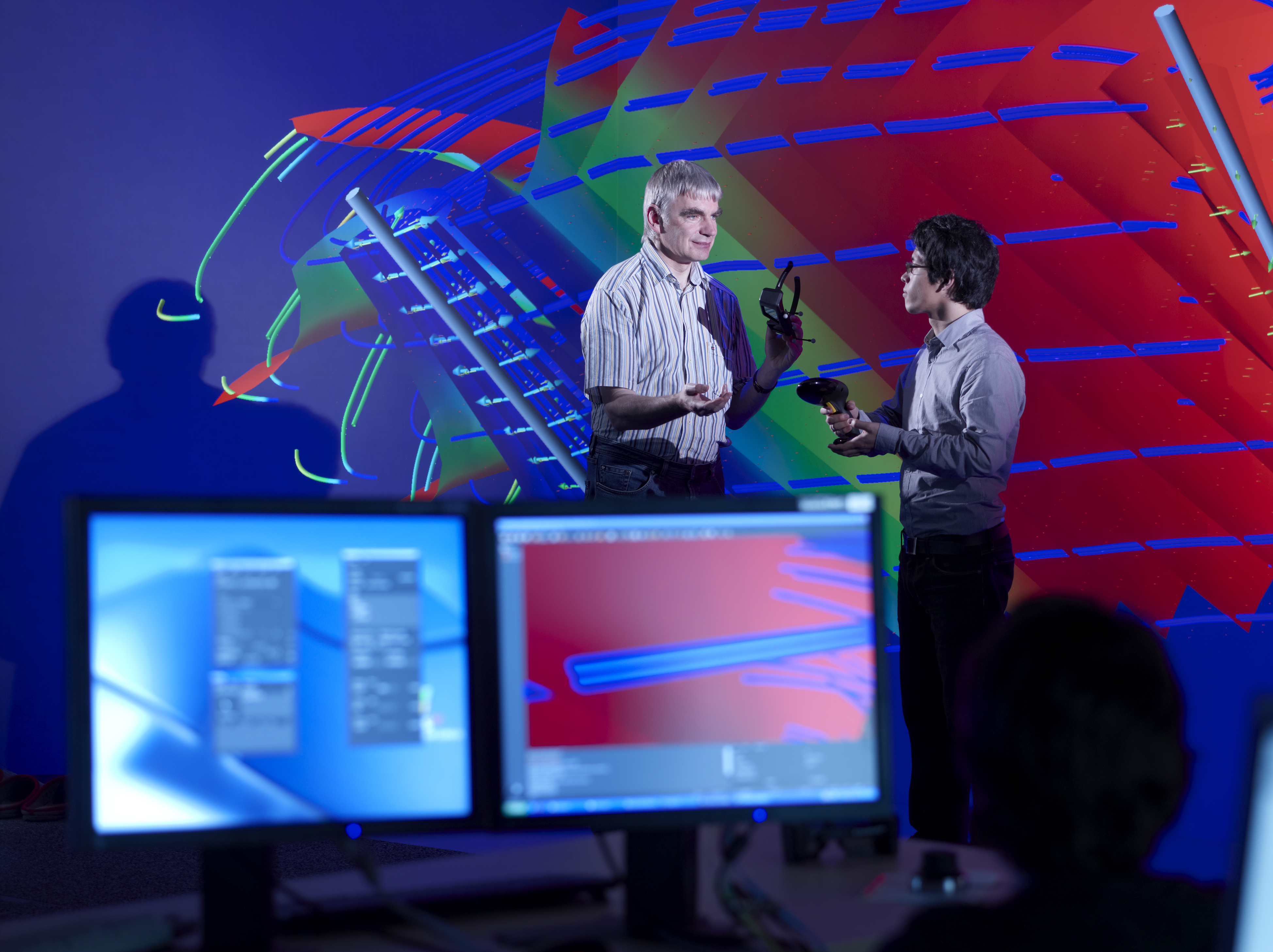 The Visualisation Centre provides a platform for scientists from various fields to explore and analyse complex and spatially heterogeneous data sets. By way of an interactive large-area stereo projection screen, scientists can immerse themselves in the projected environmental data and, thereby, acquire new insights into scientific questions and problems. Furthermore, the platform offers opportunities for knowledge transfer between researchers on the one hand side and to interested citizens on the other hand side.
The Visualisation Centre provides a platform for scientists from various fields to explore and analyse complex and spatially heterogeneous data sets. By way of an interactive large-area stereo projection screen, scientists can immerse themselves in the projected environmental data and, thereby, acquire new insights into scientific questions and problems. Furthermore, the platform offers opportunities for knowledge transfer between researchers on the one hand side and to interested citizens on the other hand side.
Services:
- Access to technical equipment for the visualisation (incl. mobile)
- Consultancy regarding possible visualisation method
- Training courses
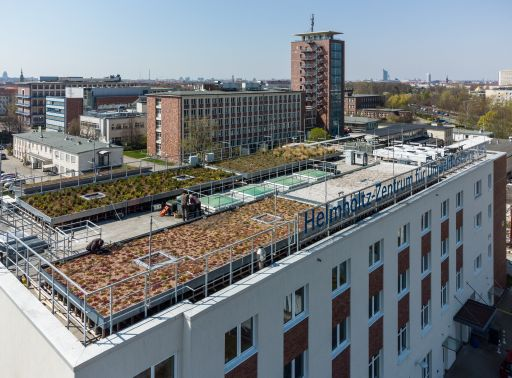 The UFZ Research Green Roof contributes to the interdisciplinary answering of current questions on the optimised effect of green roofs in urban areas. The focus of research on the research green roof is on upgrading urban green roofs for rainwater management and improving inner-city microclimates. The infrastructure is located on building 7.1 and consists of four roof segments, each with an area of approximately 80 m2: an extensive green roof, a simple intensive green roof, a wetland roof and a gravel area that serves as a reference. All roof segments were equipped with the necessary measuring technology for balancing rainwater and energies.
The UFZ Research Green Roof contributes to the interdisciplinary answering of current questions on the optimised effect of green roofs in urban areas. The focus of research on the research green roof is on upgrading urban green roofs for rainwater management and improving inner-city microclimates. The infrastructure is located on building 7.1 and consists of four roof segments, each with an area of approximately 80 m2: an extensive green roof, a simple intensive green roof, a wetland roof and a gravel area that serves as a reference. All roof segments were equipped with the necessary measuring technology for balancing rainwater and energies.
- How can different green roof types be used for rainwater and microclimate management?
- What influence do green roofs have on urban biodiversity?
- Can green roofs serve as a sink for urban pollutants?
What we offer:
- The UFZ Research Green Roof can be used for demonstration purposes for various stakeholder groups such as municipal administrations (including building & environment), as well as urban planners, but also students of relevant courses of study.
- New questions on the multifunctional use of urban green roofs are welcome. Get in touch with us!
Contact:
Dr.-Ing. Lucie Moeller
Centre for Environmental Biotechnology
Phone +49 341 235-1847
Ralf Trabitzsch
Department of Environmental Informatics
Phone +49 341 235-1590
